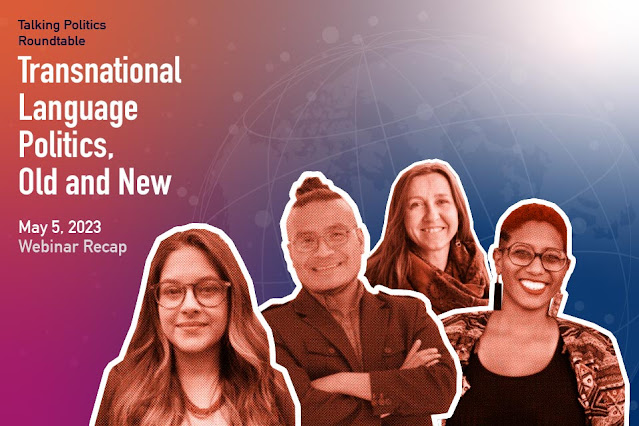(By the Talking Politics Team)
May 5, 4 pm CST
Roundtable: Transnational Language Politics, Old and New
About the roundtable: What is a mother tongue? What is an indigenous language? Who uses them, who defines them, and who gets included or excluded when their boundaries change? These categories might seem self-evident, but they’re backed by decades – even centuries – of political confusion, contestation, advocacy, activism, study, and institutionalization, both national and transnational. This roundtable’s participants will share how “mother tongue(s)” and “indigenous language(s)” appear across their research, advocacy, and revitalization work, and discuss what is made possible or impossible through these large-scale categories.
Flash Presentations + Presenter Bios:
Jessica Chandras
In 2020, India’s National Education Policy (NEP) featured new provisions designed to integrate mother tongues into all levels of pedagogy for equitable education, yet despite these provisions, the policy does not account for linguistically diverse classrooms where multiple mother tongues are present. This presentation explores how Banjara speakers, a socially and linguistically segregated Tribal community in western India, get left out by a policy designed to include them and how they seek to mitigate stigma in both classrooms and broader society.
Jessica Chandras is a linguistic anthropologist and assistant professor of anthropology at the University of North Florida. Dr. Chandras's research focuses on identity construction and social stratification through languages in education. Her on-going research in India examines values attached to language and practices of multilingual language socialization pertaining to education through a lens of power. She explores a political economy of language with a focus on intersections of language and socioeconomic class, caste, and politics of language revitalization movements.
Jaime Pérez González
Mexico’s bilingual education system does not exist in practice. Even though Mexico has an official bilingual Spanish-Indigenous language education system, monolingual Spanish is still the norm. Although there have been substantial advances in the recognition of Indigenous languages in recent years, there is still a long way to go to make linguistic rights effective and truly enable the use of national indigenous languages in all spheres of public and private life.
Jaime Pérez González is currently a Chancellor’s Postdoctoral Fellow in the Department of Linguistics at the University of California, Santa Cruz (2021–2023), and since 2021, an assistant professor in the Department of Linguistics at the University of California, Santa Barbara. He obtained his Ph.D. from UT Austin, and his MA from CIESAS (Mexico). His research goes from descriptive linguistics, language documentation, language maintenance and revitalization, interpretation and translation, language ideology, and literacy.
Martina Volfolvá
For decades, Indigenous peoples in Canada have drawn attention to harms and violences perpetrated on their communities. In response, the 2015 Report of Canada's Truth and Reconciliation Commission featured 94 Calls to Action to advance national reconciliation, including recommendations for the revitalization of Indigenous languages. But what does reconciliation mean, what is language, and how is language recovery understood on different scales? This presentation considers the impacts of state administrative responses and the ways they misalign with community understandings and priorities.
For nearly a decade, Martina Volfová has been working with Kaska Dene communities in the Yukon Territory and Northern British Columbia, Canada on the reclamation, revitalization, and documentation of the Kaska language. Currently, Dr. Volfová is the Director of the Liard First Nation Language Department, where she continues her community-based research. She uses film, photography, and audio and video recording to carry out community-based, collaborative research, which aims to produce innovative, culturally appropriate, and visually engaging language and cultural materials and resources.
Keisha Wiel
In the past fifteen years, the Caribbean islands of Aruba and Curaçao have shifted the language of instruction from Dutch to languages that are actually spoken by the student population. While policy efforts have been slow, teachers and students have always used their full linguistic repertoire in the classroom—a dynamic that I analyze as translanguaging rather than multilingualism. This presentation explores how students’ and teachers’ translanguaging allows them to comprehend both their lessons and classroom dynamics.
Keisha Wiel is a Ph.D. candidate in linguistic anthropology at Temple University. Her research examines language socialization, multilingualism, linguistic rights, and education in a postcolonial state. Primarily, it focuses on the socialization of language ideas in education and how it shapes the identity of students.

Comments
Post a Comment